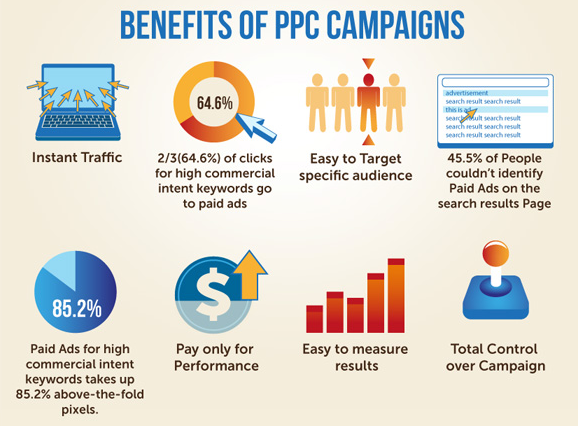PPC Made Simple: A Starter Guide
Uncover the secrets to successful PPC campaigns in this beginner’s guide, simplifying the complexities and maximizing your advertising efforts.
Table of Contents
Introduction to PPC
Online advertising has become a crucial part of marketing strategies in today’s digital age. One of the most popular methods of online advertising is Pay-Per-Click, commonly known as PPC. In this section, we will dive into what PPC is and why it is an essential tool for businesses looking to promote their products or services online.
What is PPC?
PPC stands for Pay-Per-Click, which is a model of internet marketing where advertisers pay a fee each time one of their ads is clicked. It is a way of buying visits to your site rather than attempting to earn those visits organically. Advertisers bid on keywords relevant to their target audience, and when a user searches for those keywords, the advertiser’s ad may appear. If the ad gets clicked on, the advertiser pays a small fee to the search engine. This model allows businesses to reach potential customers who are actively searching for products or services similar to what they offer.
Why is it important?
PPC campaigns are crucial for businesses looking to reach potential customers quickly. Unlike other forms of advertising that may take time to generate results, PPC ads can appear at the top of search engine results almost instantly. This means that businesses can immediately start driving traffic to their websites and generating leads. Additionally, PPC allows advertisers to target specific demographics, locations, and behaviors, making it a highly targeted form of advertising that can yield significant returns on investment.
Getting Started with PPC Campaigns
Before diving into your PPC campaign, you need to select the right platform to advertise on. Platforms like Google Ads, Bing Ads, and social media platforms offer PPC advertising options. Consider your target audience and the nature of your business to choose the platform that aligns best with your goals.
Setting Up Your Campaign
Setting up your first PPC campaign may seem daunting at first, but it’s simpler than you think. Start by defining your campaign goals, selecting relevant keywords, designing compelling ad copy, and setting your budget. As you progress, you can refine your campaign based on performance data.
Designing Effective Ads
In online internet marketing, designing effective ads is crucial for attracting potential customers to your website. A well-crafted ad can make a significant difference in the success of your PPC campaign. Let’s delve into the key components of creating compelling ads that stand out.

Image courtesy of www.360digital.co.in via Google Images
Ad Copy Basics
One of the essential elements of a successful ad is the ad copy. This is the text that appears in your ad and entices users to click on it. When writing your ad copy, keep it simple, clear, and engaging. Use language that resonates with your target audience and clearly conveys the benefits of your product or service. Remember, you only have a limited amount of space to capture your audience’s attention, so make every word count!
Visuals and Branding
While the ad copy plays a significant role, the visual elements of your ad are equally important. Images can grab users’ attention and convey your brand message effectively. Make sure to use high-quality and relevant visuals that align with your brand image. Consistency in branding across all your ads helps build trust with your audience and fosters brand recognition. Keep your visuals simple and eye-catching to attract clicks.
Monitoring Your PPC Campaigns
Monitoring and managing your PPC campaigns are crucial for ensuring their success. By keeping a close eye on how your ads are performing, you can make necessary adjustments to optimize your results and reach your goals.
| Section | Description |
|---|---|
| 1. What is PPC? | Pay-Per-Click (PPC) is a digital marketing strategy where advertisers pay a fee each time their ad is clicked. It is a way of buying visits to your site rather than attempting to earn those visits organically. |
| 2. Benefits of PPC | – Immediate results – Targeted advertising – Cost-effective – Measurable results |
| 3. Getting Started | – Set clear goals – Define your target audience – Choose the right keywords – Create compelling ad copy |
| 4. Tools for PPC | – Google Ads – Bing Ads – Facebook Ads Manager – LinkedIn Advertising |
| 5. Monitoring and Optimizing | – Monitor performance regularly – A/B test ad copy and keywords – Adjust bids and budgets – Analyze data to make informed decisions |
Analyzing Performance
One of the key aspects of monitoring your PPC campaigns is analyzing their performance. This involves looking at various metrics and data points to understand how well your ads are doing. By examining metrics like click-through rate (CTR), conversion rate, and cost per click (CPC), you can gain valuable insights into the effectiveness of your campaigns. For example, a low CTR may indicate that your ad copy or targeting needs improvement, while a high CPC could suggest that you need to adjust your bidding strategy.
Automation Tools
Monitoring your PPC campaigns can be a time-consuming task, especially if you’re running multiple campaigns across different platforms. In such cases, automation tools can be incredibly helpful. These tools can streamline the monitoring process by automatically collecting and analyzing data, sending alerts for significant changes, and even making optimization recommendations. By leveraging automation tools, you can save time and ensure that your campaigns are continuously optimized for better performance.
Optimizing and Improving
Now that you have set up your PPC campaign and it’s running, it’s essential to monitor its performance regularly. By analyzing the data and metrics provided by the platform, you can identify what’s working well and what needs improvement. If certain keywords are not driving enough traffic or conversions, consider replacing them with more effective ones. Similarly, if a particular ad copy is not getting clicks, try tweaking the wording to make it more enticing for potential customers. By continuously making adjustments based on performance data, you can optimize your campaign for better results.

Image courtesy of scabbardtech.com via Google Images
Advanced Strategies
While the basics of running a PPC campaign are crucial, advanced strategies can take your online advertising efforts to the next level. Consider implementing tactics such as A/B testing, where you create two versions of an ad or landing page to see which performs better. You can also explore retargeting, a method that shows your ads to users who have previously visited your website but did not convert. By delving into these more advanced strategies, you can refine your PPC campaigns and achieve greater success in reaching your target audience.
Conclusion
In conclusion, online advertising through PPC campaigns is a valuable tool for businesses looking to reach their target audience effectively. By understanding how to run a PPC campaign, businesses can create ads that stand out and attract potential customers. The process of monitoring and optimizing these campaigns is crucial for achieving success in the competitive landscape of online marketing.
As we’ve discussed, PPC offers a quick and efficient way to drive traffic to your website and increase brand visibility. By following the tips and strategies outlined in this guide, businesses can make the most out of their online marketing efforts and see tangible results from their PPC campaigns.
Remember, online advertising is constantly evolving, so it’s important to stay informed about the latest trends and techniques in PPC to stay ahead of the competition. With dedication and a willingness to learn, businesses can harness the power of PPC to grow their online presence and achieve their marketing goals.
FAQs
Can I run a PPC campaign on a small budget?
Yes, you can definitely run a PPC campaign on a small budget! One of the great things about PPC advertising is that you have control over how much you spend. You can set a daily budget that fits within your means and adjust it as needed. Even with a limited budget, you can still see results and reach your target audience effectively.
How long does it take to see results from a PPC campaign?
Guide and Support to Your Success
The timeline for seeing results from a PPC campaign can vary depending on various factors, such as the competitiveness of your industry, the quality of your ads, and your budget. However, in general, you can start seeing some results shortly after launching your campaign. It may take some time to optimize and fine-tune your ads for the best performance, but with consistent monitoring and adjustments, you should see improvements over time.




